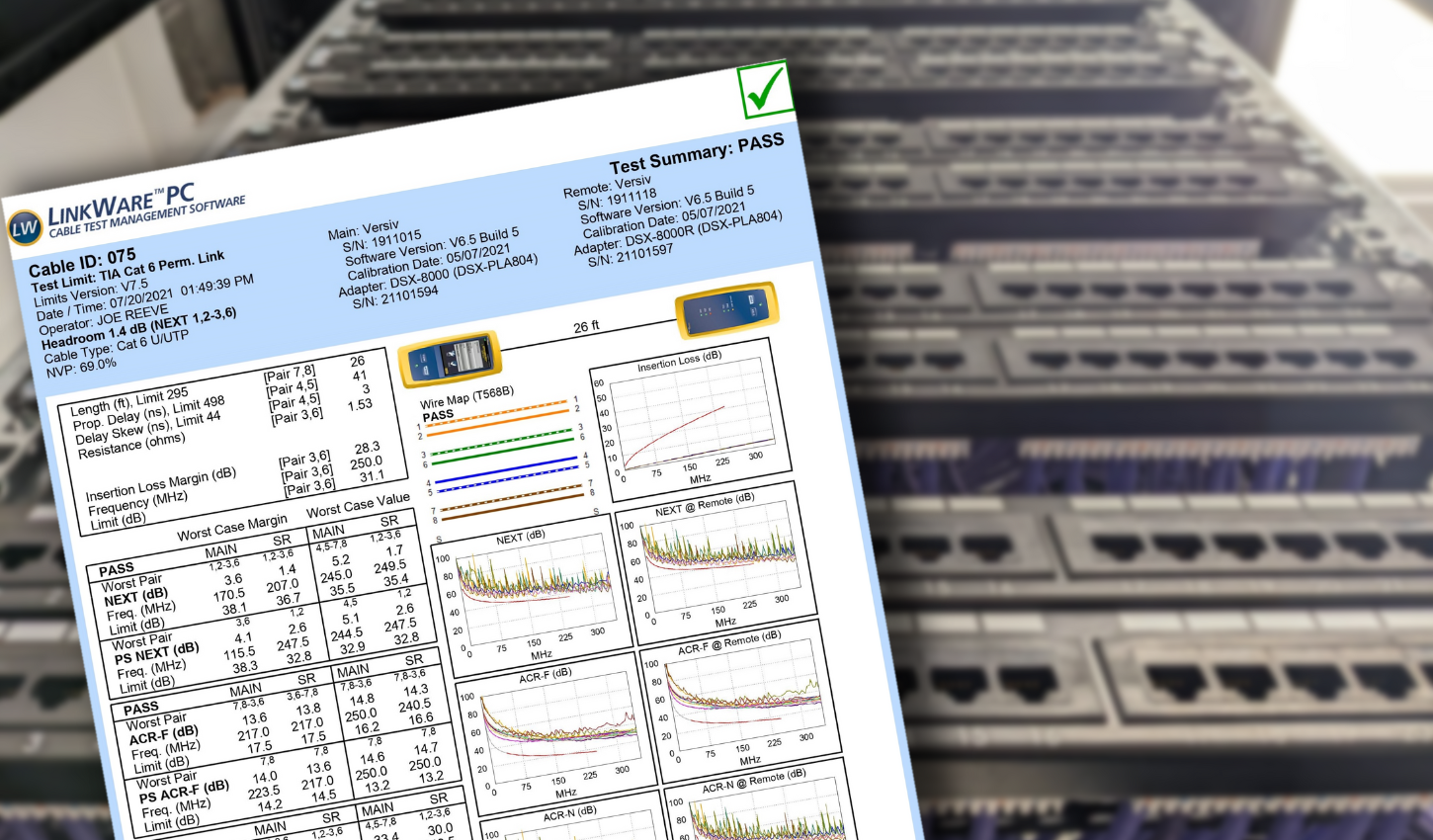Blog
Providing a valid test report of every installed cable gives any customer peace of mind knowing that their new data cabling has been installed correctly, meets industry standards and is certified to perform to specification.
Whether it’s installing additional network outlets or a brand-new data cabling installation, customers expect their cabling to work flawlessly. Therefore, installers should be confident in guaranteeing their workmanship and products.
However, if your installer or cabling company isn’t providing you with test results, how can you be sure of this? Simply “taking someone’s word” is not enough when it comes to investing in your data cabling installation. For example, if you had a new gas boiler fitted, would you “take someone’s word” that it has been installed correctly, or would you request to see test reports and certificates?
The same principle applies to your data cabling installation. In fact, cabling has been known to cause as many as half of all network failures, potentially resulting in lost revenue, staff productivity, diminished customer service and competitive disadvantage.
When testing a new data cabling installation, there are essentially three levels – verification, qualification and certification. Each of these tests is designed for a different purpose and determines what level of criteria the cabling meets as you move up the hierarchical ladder from verification to certification.
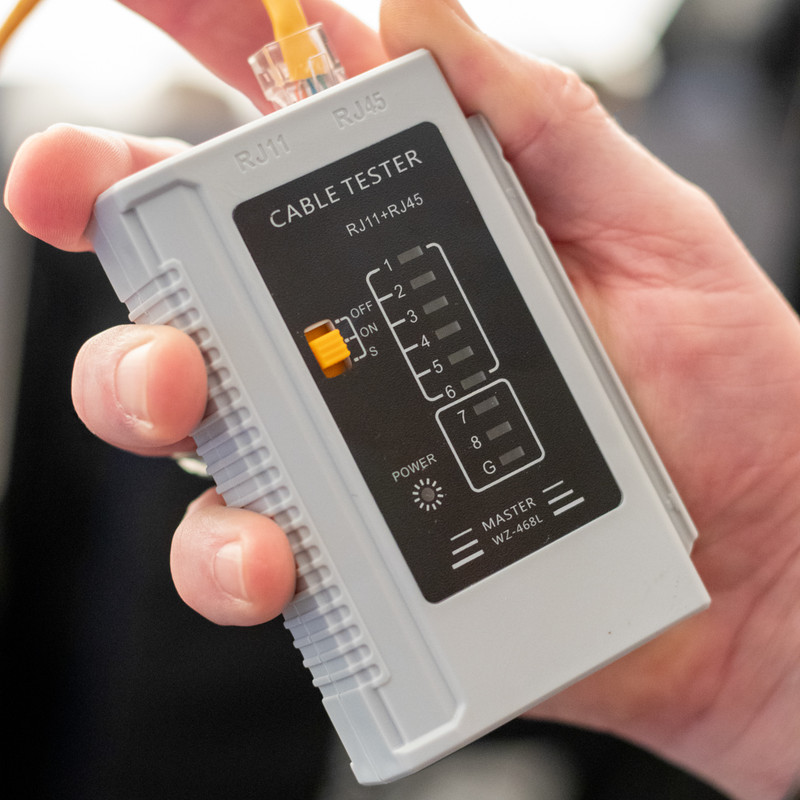
Level 1 – Verification Cable Testing / Mod Tap
A verification test or better known as mod-tap testing, is a simple-to-use and low-cost testing method to perform basic continuity functions such as wire map and toning. This entry-level of testing indicates a cable wiring sequence or termination errors of one-, two-, three and four-pair voice and data channels. It will show a continuous order of 1-8 LED display alerts to show that each pair is connected to the correct pins at the other end. The toning functionality is used to help identify and trace out a specific cable in a bundle.
This testing method is ideal for basic troubleshooting and is generally the first line of defence in finding cabling and network faults. However, verification testing alone will not verify a cable's ability to support specific applications and, as a result, is not standards-compliant to meet the requirements of a manufacturer's warranty.
Due to the low cost of this type of testing equipment (£10-£25) and the fact that it is vastly available from many local wholesalers, most incompetent or unqualified data cabling installers will consider this method as their only level of cable testing. Unfortunately, while this level of testing verifies the continuity of an installed cable, it does not certify or qualify that it is able to perform to its specification or meets industry standards.
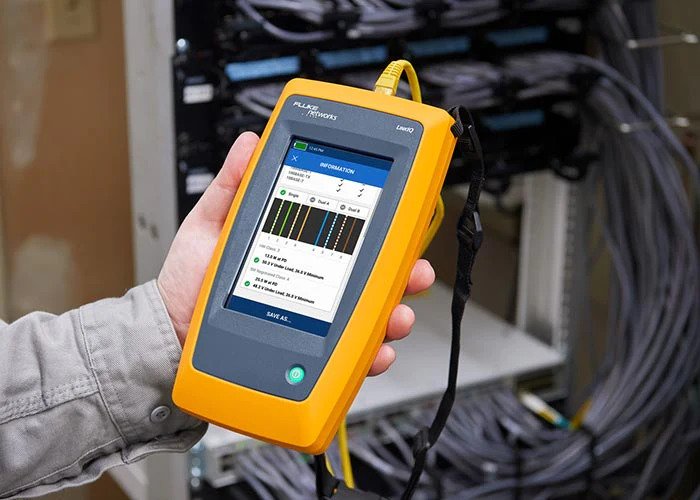
Level 2 – Qualification Testing
Qualification cable testers include the functions of verification tools but are more advanced with their ability to qualify cabling bandwidth whilst diagnosing common cabling problems.
This level of testing can determine whether an installed cable can support the requirements for “Fast Ethernet” (100BASE-TX), VOIP and Gigabit Ethernet. Combined with the verification functionality, qualification testers are also excellent troubleshooting tools. They are ideal for smaller-sized cabling installations, such as adds, moves and changes or where the customer does not require a manufacturer warranty.
Qualification tools are much more powerful than verification tools therefore, the cost of this equipment is much higher, and they are more challenging to acquire. Generally, qualification testing equipment can cost between £500-£2,500, depending on your chosen brand.
Most qualified data cabling and network installation engineers would be expected to carry this level of equipment or higher.
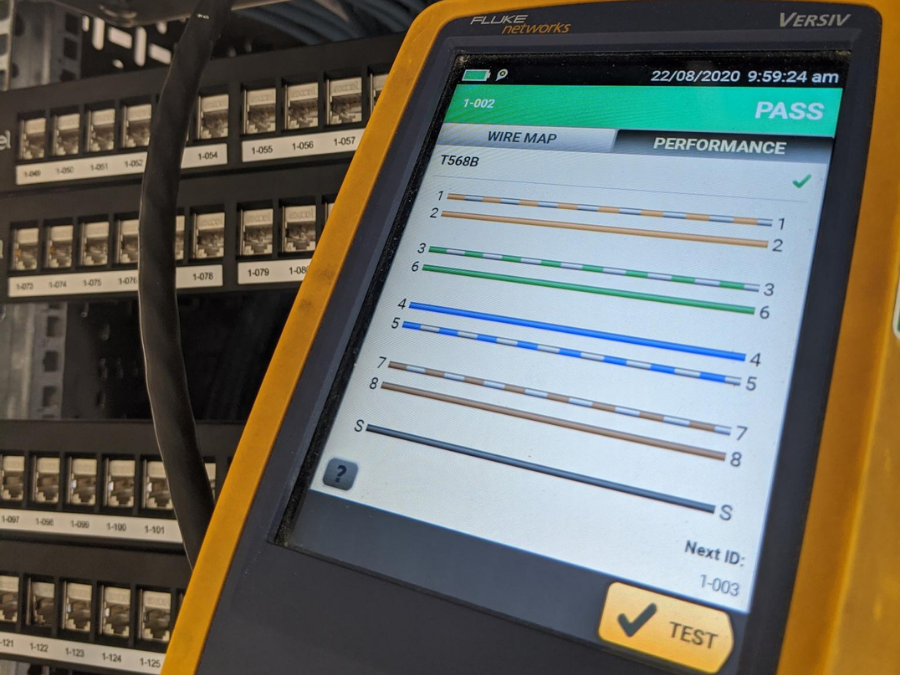
Level 3 – Cable Certification
Certification is the highest level and the most rigorous of all cable testing. This level of testing is primarily used by commercial data cabling installers/contractors to guarantee their new cabling installations meet the requirements of industry standards.
A certification cable test includes all the testing that goes into verification and qualification but also makes several additional measurements across predefined frequency ranges and compares the detailed test results against the standards set by TIA or ISO. It ensures that each cable measures to meet its performance specification and installation parameters and subsequently gives a Pass or Fail result. The measurement is based on several factors which determine if an installed cable is compliant with its tested Category or Class of cable (e.g. Cat 5e, Cat 6, Class D).
It can detect poor termination and installation practices, including excessive untwisting of pairs and tight bending of the cable. If the cable has been installed near high voltage and electrical cabling, this will also be picked up and, as a result, Fail a certification test.
Unlike verification and qualification, a certification test provides an advanced graphical result and offers feature-rich reporting capabilities. Results can be uploaded to the cloud and presented to a customer in a .PDF format. Below is an example of a cable that was tested using a certification tester.
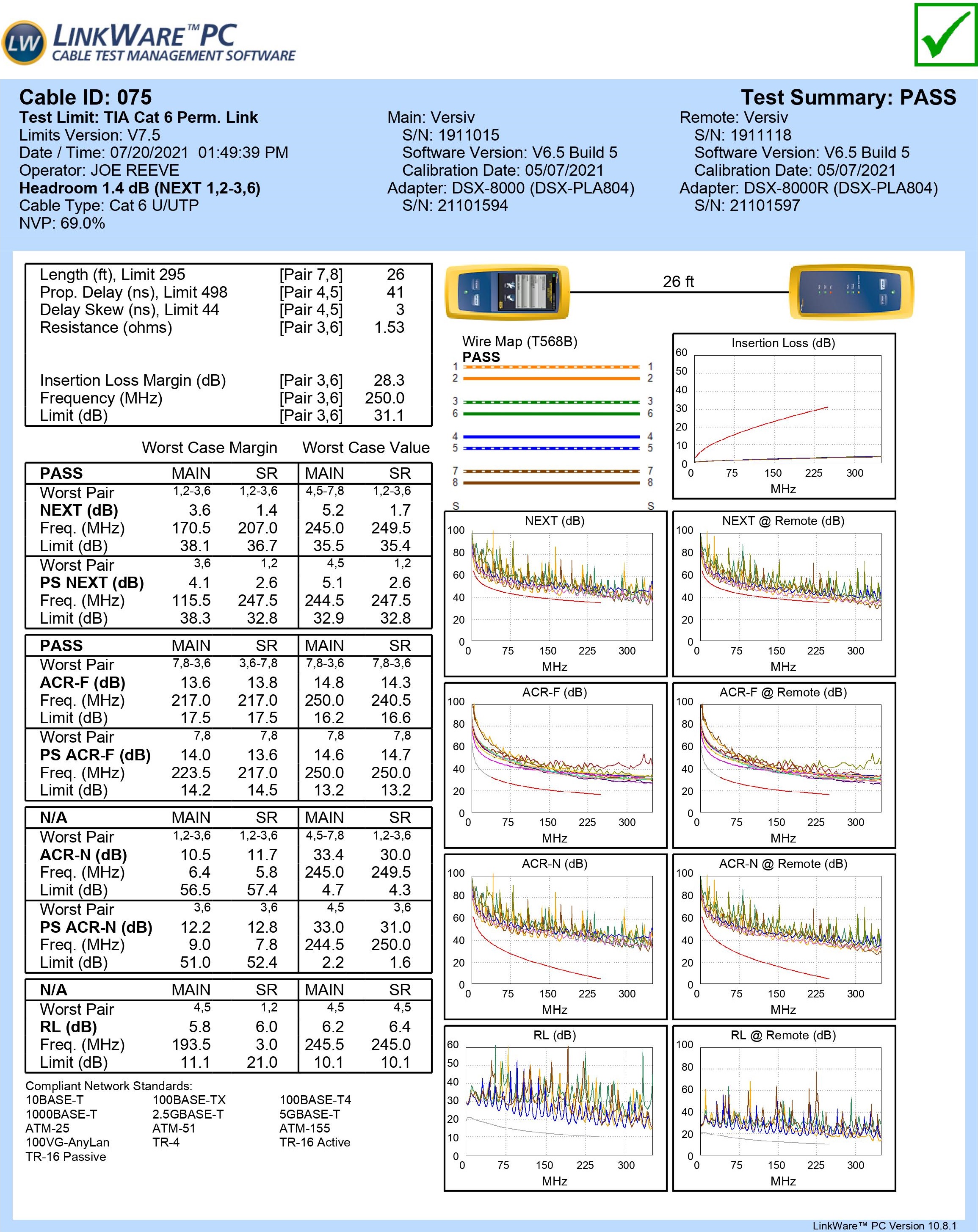
Where the installer or cabling company is required to provide a system warranty, most cabling manufacturers will only accept results that have been performed using a calibrated level III cable certification tester.
Due to the high cost of certification equipment ranging from £6,500 to £25,000, this level of testing is usually performed by specifically trained professionals with the required accreditations and training.
Which level of cable testing is right for me?
Each level of testing depends on what a customer wants to achieve from their data cabling installation. Comparing all three testing levels, from a customer perspective, it goes without saying that cable certification is a more future-proof, guaranteed and the most value for money level of testing. It provides a guaranteed result and eliminates a point of failure upon network failures.
However, this testing level comes at a much higher cost initially. As mentioned previously, cable certification equipment is an expensive investment for any cable installer or cabling company and, therefore, would reflect this within their costs upon quotation or tender. Consequently, it is ideal for medium to large-sized cabling installations where the customer requires a manufacturer’s warranty.
On the other hand, a qualification test would be the most suitable option if a customer does not require a warranty but needs proof that the cabling is correctly installed and can support a specific bandwidth. This level of testing is ideal for adds, moves and changes or small-size cabling installations.
A verification test is only a first line of defence when identifying a cabling fault. Most commercial cabling installers and contractors will use this when a cable cannot be traced back to its labelling guide. Although, if used as an only testing option, this would be ideal in simple DIY, domestic or residential installations where basic continuity is required.
While a cable may pass a verification and qualification test, will it pass a certification test?
Most tender specifications now request for a data cabling installation company to provide a 25-year manufacture warranty with cable certification test results in a .PDF file format.
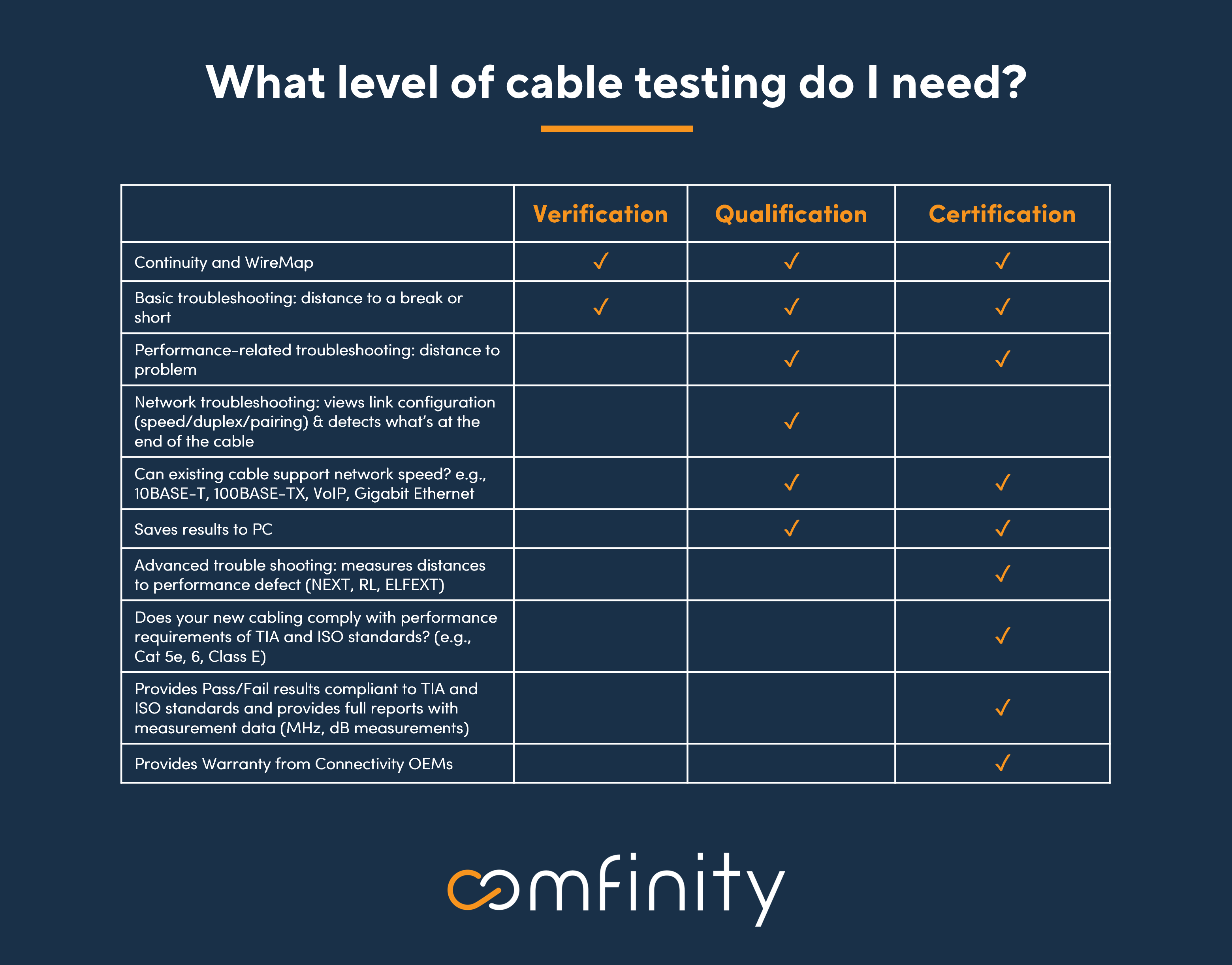
Add a comment:
Get in Touch
Want to know what we can do for you? Please use this form to contact our team.


